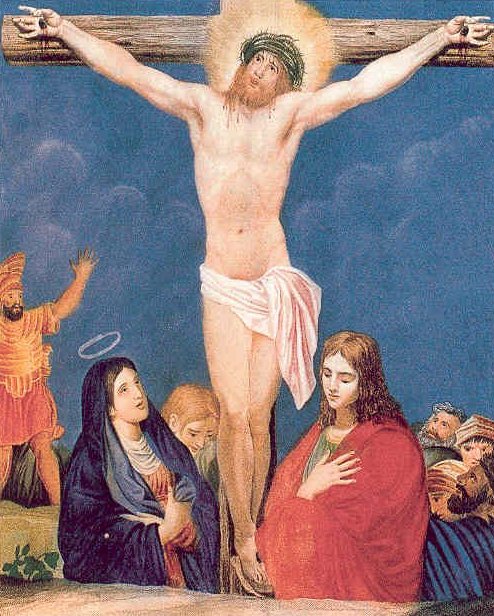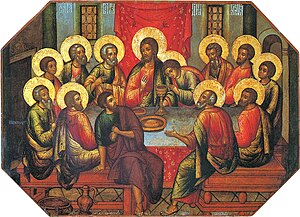Recently, a friend of mine came to Mass one Sunday at the collegiate chapel where I am themusic director. He normally goes to the parish church. Afterwards he commented, “My, you do a lot of Gregorian chant! Is that really necessary? Isn’t that too much!?” I felt like saying, “If you go to a seafood restaurant would you complain to the manager that there is too much fish on the menu?” I didn’t say this for three reasons: (1) it was one of those great comeback lines that one thinks of only hours later, (2) as a true friend I preferred an explanation to a comeback, and (3) while it makes sense to me and most of the readers of this journal, it probably would have absolutely confused him. Instead I said, “I’m being obedient to Vatican II, article 116 of the Liturgy Constitution”—to which he replied, “Really, I don’t know too much about such things. I suppose I have a lot to learn.”
this journal, it probably would have absolutely confused him. Instead I said, “I’m being obedient to Vatican II, article 116 of the Liturgy Constitution”—to which he replied, “Really, I don’t know too much about such things. I suppose I have a lot to learn.”
Now this person is not a liberal Catholic by any stretch of the imagination. He is quite orthodox in matters of doctrine, faith, and morals—and quite devout—but simply does not have much of a liturgical culture. My entrée with him was an argument from the Church’s magisterium. (We were interrupted, but I intend to continue the conversation at some point in the future.)
I know of a number of good Catholics like this. Someone similar said to me a while back, “High Mass, low Mass, charismatic Mass, Latin Mass, how can someone say that one Mass is better than another?” Again, I said, “Oh, but the church herself says that the sung High Mass is the more noble form of worship, Article 113 of Vatican II’s Liturgy Constitution.” I then proceeded to explain that, though a low Mass celebrated on the hood of a jeep by a military chaplain in time of war is objectively the same as a Pontifical High Mass celebrated in St. John Lateran, there is a reason why the church has many times practiced (and recommends) the latter, while the former is only practiced in emergency situations.
What I am finding, in this era of the New Liturgical Movement, is that the liturgical culture of most Catholics has been absolutely decimated—and I am talking about good practicing Catholics. What such Catholics have been left with is a kind of a neo-Thomistic focus on the validity of the consecration and then, lacking a liturgical culture, they fill the void with an American consumerist mentality—a kind of a Baskin-Robbins’ 31 flavors mentality. In other words, “I like Chocolate, he likes Vanilla, she likes Butter Scotch Rum, as long as we eat the same validly made ice cream, it doesn’t matter. There is no normative flavor.” It is totally a matter of subjective, individual choice.
One cannot appeal to such Catholics, at least initially, using aesthetic arguments or even cultural arguments—because there is no normative liturgical culture which they know. They do, however, respond to arguments from authority.
The thing is, though, that there is this objective liturgical cultus that has been the Roman Rite for centuries. Gregorian chant is the music that is normative, proper to the Roman Rite. It is the only music in the official liturgical books for this reason. The Church has continuously taught this throughout the twentieth and twenty-first centuries. Any other music is there by means of addition or substitution for the normative, official music—Gregorian chant.
This is not to deny that these valid “substitutions” can happen to varying degrees based upon pastoral prudence and even subjective choice. The problem is that these subjective choices have been allowed and practiced to such a great degree over the past forty years that the Roman Rite’s very own music has been almost totally erased in the actual experience of probably a majority of Catholics.
The Roman Rite as an actual historical cultus with its own traditions, customs and music has been considerably dimmed. At least before Vatican II Catholics knew “what the score was” even if many of them would go to a more stripped down low Mass because it was quicker.
If I could continue with my restaurant analogy, too many Roman Rite Catholics have been going to seafood restaurants that have been serving little to no fish. They need to learn that, whatever their subjective preferences, fish will be a big part of the menu.
Source: Winter 2007 Volume 134, Number 4 Sacred Music
 this journal, it probably would have absolutely confused him. Instead I said, “I’m being obedient to Vatican II, article 116 of the Liturgy Constitution”—to which he replied, “Really, I don’t know too much about such things. I suppose I have a lot to learn.”
this journal, it probably would have absolutely confused him. Instead I said, “I’m being obedient to Vatican II, article 116 of the Liturgy Constitution”—to which he replied, “Really, I don’t know too much about such things. I suppose I have a lot to learn.”Now this person is not a liberal Catholic by any stretch of the imagination. He is quite orthodox in matters of doctrine, faith, and morals—and quite devout—but simply does not have much of a liturgical culture. My entrée with him was an argument from the Church’s magisterium. (We were interrupted, but I intend to continue the conversation at some point in the future.)
I know of a number of good Catholics like this. Someone similar said to me a while back, “High Mass, low Mass, charismatic Mass, Latin Mass, how can someone say that one Mass is better than another?” Again, I said, “Oh, but the church herself says that the sung High Mass is the more noble form of worship, Article 113 of Vatican II’s Liturgy Constitution.” I then proceeded to explain that, though a low Mass celebrated on the hood of a jeep by a military chaplain in time of war is objectively the same as a Pontifical High Mass celebrated in St. John Lateran, there is a reason why the church has many times practiced (and recommends) the latter, while the former is only practiced in emergency situations.
What I am finding, in this era of the New Liturgical Movement, is that the liturgical culture of most Catholics has been absolutely decimated—and I am talking about good practicing Catholics. What such Catholics have been left with is a kind of a neo-Thomistic focus on the validity of the consecration and then, lacking a liturgical culture, they fill the void with an American consumerist mentality—a kind of a Baskin-Robbins’ 31 flavors mentality. In other words, “I like Chocolate, he likes Vanilla, she likes Butter Scotch Rum, as long as we eat the same validly made ice cream, it doesn’t matter. There is no normative flavor.” It is totally a matter of subjective, individual choice.
One cannot appeal to such Catholics, at least initially, using aesthetic arguments or even cultural arguments—because there is no normative liturgical culture which they know. They do, however, respond to arguments from authority.
The thing is, though, that there is this objective liturgical cultus that has been the Roman Rite for centuries. Gregorian chant is the music that is normative, proper to the Roman Rite. It is the only music in the official liturgical books for this reason. The Church has continuously taught this throughout the twentieth and twenty-first centuries. Any other music is there by means of addition or substitution for the normative, official music—Gregorian chant.
This is not to deny that these valid “substitutions” can happen to varying degrees based upon pastoral prudence and even subjective choice. The problem is that these subjective choices have been allowed and practiced to such a great degree over the past forty years that the Roman Rite’s very own music has been almost totally erased in the actual experience of probably a majority of Catholics.
The Roman Rite as an actual historical cultus with its own traditions, customs and music has been considerably dimmed. At least before Vatican II Catholics knew “what the score was” even if many of them would go to a more stripped down low Mass because it was quicker.
If I could continue with my restaurant analogy, too many Roman Rite Catholics have been going to seafood restaurants that have been serving little to no fish. They need to learn that, whatever their subjective preferences, fish will be a big part of the menu.
Kurt Poterack is editor-at-large of Sacred Music. He teaches music at Christendom College. poterack@hotmail.com
Source: Winter 2007 Volume 134, Number 4 Sacred Music









